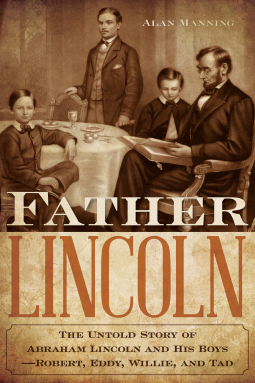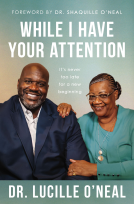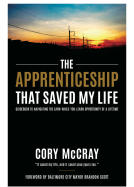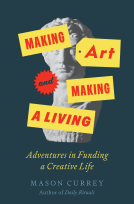
Father Lincoln
The Untold Story of Abraham Lincoln and His Boys--Robert, Eddy, Willie, and Tad
by Alan Manning
This title was previously available on NetGalley and is now archived.
Send NetGalley books directly to your Kindle or Kindle app
1
To read on a Kindle or Kindle app, please add kindle@netgalley.com as an approved email address to receive files in your Amazon account. Click here for step-by-step instructions.
2
Also find your Kindle email address within your Amazon account, and enter it here.
Pub Date May 01 2016 | Archive Date May 13 2016
Rowman & Littlefield | Lyons Press
Description
Alan Manning is an independent historian and teacher. He received a B.S. in Business Administration from the University of Southern California, an M.A. in History from the University of West Florida, and a J.D. from the UCLA School of Law, where he was an editor of the Law Review. Manning practiced law for over 25 years at international and regional law firms before taking an early retirement in order to teach American history and to write. He currently teaches in the History Department at the University of West Florida and at Pensacola Catholic High and is a frequent speaker and lecturer on presidential history, a subject for which he has a particular passion. As he researched and wrote this book, Manning's experience of practicing law while raising four daughters gave him a unique insight into Lincoln’s life. He lives in Pensacola, Florida, with his wife and children.
A Note From the Publisher
Available Editions
| EDITION | Other Format |
| ISBN | 9781493018239 |
| PRICE | $26.95 (USD) |
Links
Average rating from 14 members
Featured Reviews
 James D, Educator
James D, Educator
Before describing Lincoln as a father, Manning spends a chapter describing him as a boy, showing how his relationship with his own father, Thomas, became so strained. Abraham Lincoln was indeed born in a log cabin, indeed he received only three years of formal education, and in fact he was raised to become a common, subsistence farmer like his father...until Abraham rebelled. His devotion to developing his own mind led him to a law practice, Congress, and ultimately the White House.
Manning is right to frame Lincoln's own fatherhood in the light of his pulling away from his father. There is more focus on the Springfield years here than in most biographies of the 16th President (although less about Lincoln and Mary's relationship than one would expect).
Lincoln married Mary soon after starting his law practice, and his first son, Robert, was born a year later. A man on the move, Lincoln traveled the judicial circuit for weeks and months at a time, building his practice and developing his skills--naturally, this would pay off later for him when he moved into politics. But Robert, growing up with a largely absent father, took after the Todd side of the family, earnest and forthright.
Lincoln's parenting appears to have changed after the short life of his second son, Eddy. He wasn't a bad father. He was home at Eddy's birth, and he was there when Eddy died at the age of four. This death, Manning writes, inspired a spiritual search for Lincoln. The family would draw close to a Presbyterian pastor in Springfield, but Lincoln would never formally associate himself with any Christian denomination, even as he cited the Bible in many of his greatest speeches.
Two more sons followed soon after Eddy's death, William and Tad. Manning shows Lincoln as an indulgent father--paying for pranks the boys played, working steadily in his office as they raised hell all around, housing a succession of varied pets. This is the Father Abraham that we want to see.
The presidency posed challenges for Lincoln as a father. Robert was at Harvard throughout his first time--and Lincoln suffered politically for the fact that his military-aged son was not fighting in his father's war. Willie and Tad roamed the White House, and the darkest year of the war, 1862, when the Union appeared to have snatched defeat from the jaws of victory, was also the year that Willie died, aged 12.
It may seem like I have given away too much of the book, but Manning has included many rich anecdotes--from Robert, friends in Springfield, and witnesses to the Lincolns' White House years--that are worth savoring and sharing. My favorite was the scene of Lincoln and Tad walking through the streets of Richmond--just days before his death--acclaimed by hundreds of African Americans. I had ready of the scene, but I did not remember Tad's part in it. I won't forget it now.
More importantly, Manning maintains his focus on Lincoln's fatherhood and ignores significant distractions that might trip up other biographers. There is very little here about the Lincoln-Douglas debates, the 1860 & 1864 campaigns, or the war.
This is a great book for fathers, Americans, and history-lovers.
(A special thank-you to NetGalley for letting me preview this book.)
One of the reasons I set this president goal for myself last year was because I have read extensively about Washington, Lincoln, and Kennedy, but few others. I thought I knew as much as there was to know about Lincoln. After all, he is arguably the most written-about president in US history. I was very happy then to see this book on NetGalley and requested it immediately (over a year ago of course, because in 2017 I got sidetracked by other projects and so many galleys lingered in limbo on my Kindle). I only knew vaguely of the supposed overindulgence that Lincoln engaged in with his young sons, but not much else. This book gives a completely new layer to the man known as the Great Emancipator. We see him in his most important role, that of a father to four boys. I feel like this book helps us to truly complete the picture of Lincoln as a whole man. He was 100% dedicated to providing for his family, which caused him to be away from Mary, Robert, and Eddy so often in those early years and he had to find a balance between his law practice and home life. This was a bit easier for him to do once in the White House, as his family was always with him - much to the irritation of some of his cabinet members.
There is a significant amount of research here. In my copy as an ARC, the text itself ended at 66% and the notes ran from 67%-90%. Following that, the primary and secondary sources ran 90%-96%. While I am still a bit skeptical on this idea that the author regularly asserts - that basically fathers in the 19th century were becoming more involved in the raising of their children, that does seem to be the case here for Lincoln in what we can interpret from letters, etc. This does not mean that fathers had nothing to do with raising their children ever until the 21st century, just that it almost came across at times as though the author was trying to assert that fathers wanted to also be in the caregiver role and I do not think that was the case. It is not a major flaw, as it is clear that Lincoln enjoyed spending time with his children, but I think it is a blanket statement that does not apply to all fathers of the period.
Before we are introduced the the relationships that Lincoln had with his own sons, we see the foundation of it being built in Lincoln's relationship with his own father. In previous books this has been a highly contentious relationship and Thomas has often been viewed as abusive and distant and overbearing. While those things may well be true, here Manning at least presents Thomas Lincoln in the context of his time period. Men in his generation did not think of saving for the future, they worked the land to survive. Thomas and Abraham could not have been more different and I do think that could be why later Lincoln was so indulgent with his own sons. They got away with everything because Lincoln had gotten away with nothing. Thomas physically disciplined young Abe, Lincoln could not have been more opposite. The entire tenure of the family's stay in DC is punctuated by the pranks and disruptions of the younger boys, Willie and Tad. And it seemed the boys knew their father would not discipline them, given memories recorded by observers to such activities. Nothing they did seemed to bother Lincoln, from their tendencies to ring all the bells in the White House to panic the clerks and messengers, to eating all the strawberries being grown for a state dinner. He did not ignore everything though, and even when he went about sorting out problems between the boys, he did so in a loving way. In one instance when the boys traded each other - a new knife for a few pieces of candy - and it was not fair, Lincoln put the questions to the boys whether it was fair and they fixed it themselves.
The majority of the book seemed to focus on Lincoln's relationship between the two younger boys, Willie and Tad. When Robert and Eddy were young, Lincoln was away in other towns, trying cases for those places that had no lawyers. He did so in order to build up his practice, and put in motion the wheels that would eventually carry him to the White House. As a result, Lincoln was not as close to Robert. The author spent a lot of time trying to explain this away as though Robert was trying to keep his family life private after his father's assassination. It very well could be a mix of the two, and to me this is not something that necessarily needs to be explained away. It makes sense that they would not be as close, given Lincoln's absences during Robert's formative years. However, there are references to correspondences throughout Robert's life, from his youth to his time at college. Perhaps the gap was not as wide as previous historians have assumed. Unfortunately Eddy passed away at a young age, before the other two were born. In the wake of Eddy's death we see Lincoln openly mourning his son and grieving the loss. Perhaps it was this loss that made Lincoln realize that he needed to be home more often, and the younger boys certainly benefited from that. We see that grief rear its head again when Willie - Lincoln's favorite son - dies at age 12.
One thing I appreciated greatly about this text was the fact that lived up to its name and focused on the side of Lincoln as a father. It does not become political and only discusses those major events in Lincoln's career from the viewpoint of him as a father and how/if anything impacted the boys. We are not given yet another history of the famed Lincoln-Douglas debates, his presidential campaigns, or much involving the Civil War. For the most part, the war is only dealt with in how it impacted Robert, who was of age to become a soldier and wanted desperately to do so - and his parents terrified of him doing so. In that instance we do see Lincoln and Mary as President and First Lady, but a father and mother afraid of losing yet another son too soon. Perhaps somewhat ironically, Robert would be their only son to live to adulthood. Tad died at seventeen, thought this was after his father's assassination. Only Mary would see the loss of yet another son.
All in all, this was a very enlightening book about a side of Lincoln I did not really know. I knew him as the politician and this book does well to present him as a loving father who loved his sons deeply. Highly recommended.
Readers who liked this book also liked:
Scott Michael LeRette
Biographies & Memoirs, Christian, Parenting, Families, Relationships


















